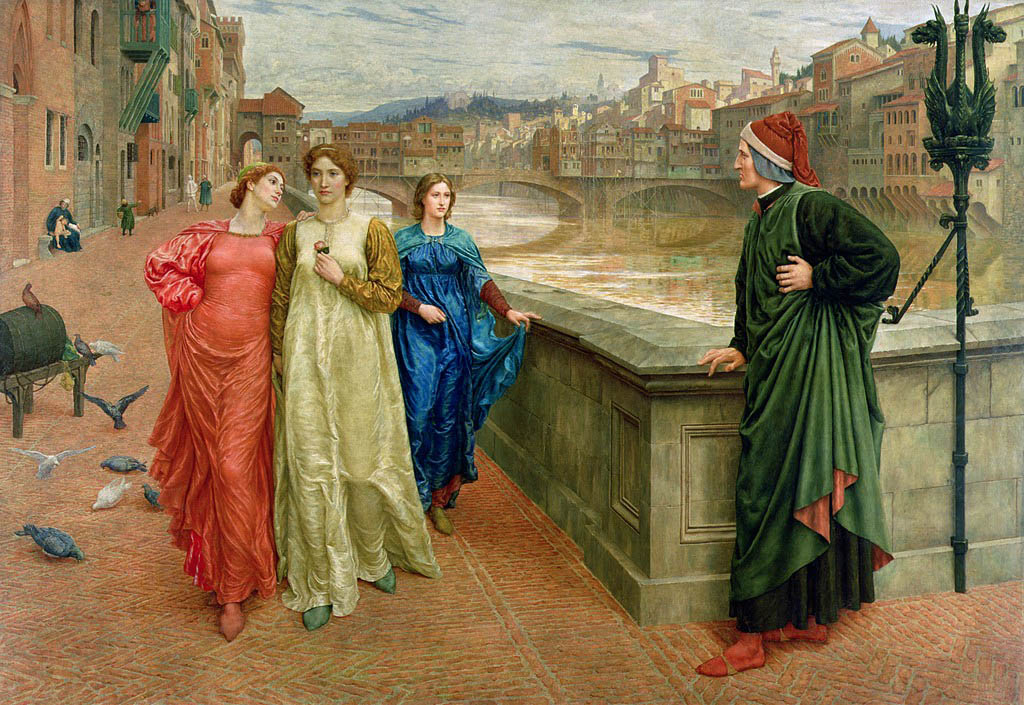Italy is very proud of Dante degli Alghieri – although we tend to refer to him simply as Dante. His poem written in the early fourteenth century is sometimes referred to as Dante’s Inferno. In truth, the name of the epic poem is The Divine Comedy. It describes the author’s journey through the afterlife. Next year marks the 700th anniversary of Dante’s death and as the world gears up for the celebrations, Italy has declared March 25th as an annual national day in honor of Dante, to be known as “Dantedì.”
Who was Dante and how much do we actually know about him? You will be able to sound like an expert after reading these unusual facts about the poet.
Ten things you never knew about Dante
1. He had a wife and four children
A lot of Dante’s work is devoted to Beatrice, a woman he met when she was only nine years old and who died young, sending the poet into deep grief. He wrote love sonnets dedicated to her and in the Divine Comedy, it is Beatrice (in the form of an angel) who guides him through to Paradise. Although it sounds romantic, Dante had a wife and four children back home. His family was not too pleased to receive no mention at all in his famous epic. Dante married Gemma Donati after betrothed to her at the age of twelve. They had four children together, Jacopo, Pietro, Giovanni and Antonia, who later became a nun, coincidentally adopting the name Sister Beatrice.
2. He was a physician, politician and soldier
Dante did a lot more than write poetry; in fact, he led a very active life and was trained as a physician. He joined the guild of apothecaries, but only in an attempt to further his political career. Dante held various public offices throughout his time in Florence and fought in the Battle of Campaldino against Arezzo.
3. He was given a death sentence and was only pardoned in 2008
The poet lived in a time when his hometown of Florence was going through political turmoil. When a rival faction gained control of the city, they exiled Dante from his hometown for barratry (political corruption). All of his property was confiscated and his sentence included a clause that he would be burned at the stake if he ever returned. It wasn’t until 2008 that Florence’s city council decided it was time to make amends and passed a motion officially pardoning him.
4. His bones were missing for centuries
Still in exile when he died of malaria, Dante was buried at a church in Ravenna, the town in which he lived at the time of his death. Florence later decided they wanted to bury Dante in their own city and built a spectacular tomb for his remains. Pope Leo X and Michelangelo were among those who campaigned for the poet’s remains to be returned to his hometown. The monks in Ravenna sent an empty coffin and kept Dante’s bones hidden in a cloister wall. It was not until 1865 that his remains were accidently discovered during a construction project at the church. Florence is still trying to have his remains brought back to the city of his birth and has made a pitch to do so for the 2021 celebrations, but old rivalries run deep. Even after seven centuries, Ravenna has still not consented to the Florentine request!
5. Dante had a great memory
There is a spot marked by a plaque in Florence, where Dante liked to sit and write his love poems about Beatrice, while watching the construction of the Duomo. According to an anecdote, he was once asked by a passerby what he ate for breakfast. “Eggs,” replied Dante. A year later, the same man walked past Dante again, sitting on his favorite rock and tested the poet’s already notorious memory. “How?” asked the man, to which Dante quickly responded: “With salt.”
6. He was famous for telling the truth
Dante had a reputation as an honest man through his work as a public official. One legend states that when exiled from Florence, he was stopped by authorities asking if he knew where Dante was. Despite his life being at stake, Dante was so determined not to lie that he tricked them with word-play by saying: “When I was coming down the road, he did not pass me.”
7. He was more responsible for the use of Italian in writing than anyone before or after
Dante and his Divine Comedy paved the way for writing literature in the vernacular Italian language. Previously, Italian as a language had been looked down upon for literary works. It has since been studied and researched. The result is that approximately 15 percent of the vocabulary in use in standard Italian today can be traced back to the Florentine poet. That includes words he invented, as well as several complete phrases that survive today. This is ‘vendetta allegra’ (roughly translated as sweet revenge) for the poet.
8. You have surely heard quotes by Dante
Dante’s Divine Comedy spawned many English translations. Aside from the film adaptations, it has been referenced or quoted in the movies Ice Age, Hannibal and Ghostbusters II. It has also been mentioned on television in Mad Men, How I Met Your Mother and Law & Order.
9. He was ahead of his time
Those who have studied his lengthy works may not think of Dante as a modern writer, but in several respects he was extremely advanced. Aside from being one of the first Italian writers to move away from using Latin for literature, he was one of the first to come up with an idea of a Limbo, where noble and innocent people who were not Christian could rest in peace. Before this, it was generally thought that unborn babies and pagans ended up in hell.
10. Three was his lucky number
Dante’s most famous work is split into three parts (one for each section of the afterlife) and each of these is split into 33 verses or ‘canti’ – plus an introduction to make 100 in total, the ‘perfect number.’ But the number three crops up much more often than that; his rhyme scheme, terza rima, revolves around it and the Holy Trinity has infernal counterparts in the three rivers of hell, three kinds of sins punished (each with three subdivisions) and of course, a three-headed beast guarding the Circle of Gluttonous.
Now that you have these facts in mind, you will be well-armed the next time the subject of Dante degli Alghieri comes up in conversation.





